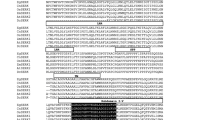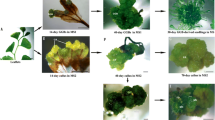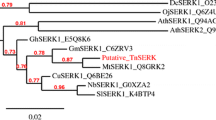Abstract
Somatic embryogenesis (SE) is one of the most important steps during regeneration, but the molecular mechanism of SE remains unclear for Cedrela odorata. SOMATIC EMBRYOGENESIS RECEPTOR-LIKE KINASE (SERK) is one of the genes associated with induction of SE and is considered a marker of cells competent to form somatic embryos. Our objective was to clone and characterize the SERK1 and SERK2 gene homologues and analyze their expression patterns during in vitro morphogenesis in Spanish cedar. CoSERK1 and CoSERK2 were isolated from cedar, both share domains characteristic of the SERK family, including leucine-rich repeats, a proline-rich motif, a transmembrane domain, and kinase domains. Embryogenic cultures were established from callus cultures induced on medium supplemented with 1 mg/L dicamba. Histological sections were studied to determine the embryogenic nature of the samples. The CoSERK1 gene was highly expressed during the acquisition of embryogenic competence. The expression level of SERK1 was lower in non-embryogenic tissues and organs than in embryogenic calli, and it was higher in 3-week old embryogenic calli. CoSERK2 gene was highly expressed in leaves and shoots but no difference in expression was obtained between somatic and embryogenic tissues. These results suggest that the expression of CoSERK1 is associated with somatic embryogenesis induction and could be used as a potential marker to monitor the transition from competent to embryogenic cells and tissues in Spanish cedar.




Similar content being viewed by others
Abbreviations
- SERK:
-
Somatic embryogenesis receptor-like kinase
- SE:
-
Somatic embryogenesis
- IZE:
-
Immature zygotic embryo
- MZE:
-
Mature zygotic embryo
- 2,4-D:
-
2,4-Dichlorophenoxyacetic acid
- BAP:
-
6-Benzylaminopurine
- ZEA:
-
Zeatin
- cDNA:
-
Complementary DNA
- RT-PCR:
-
Reverse transcription polymerase chain reaction
References
aan den Toorn M, Albrecht C, de Vries S (2015) On the origin of SERKs: bioinformatics analysis of the somatic embryogenesis receptor kinases. Mol Plant 8:762–782. https://doi.org/10.1016/j.molp.2015.03.015
Baudino S, Hansen S, Brettschneider R et al (2001) Molecular characterisation of two novel maize LRR receptor-like kinases, which belong to the SERK gene family. Planta 213:1–10. https://doi.org/10.1007/s004250000471
Boutilier K, Offringa R, Sharma V et al (2002) Ectopic expression of BABY BOOM triggers a conversion from vegetative to embryonic growth. Plant Cell Online 14:1737–1749. https://doi.org/10.1105/tpc.001941
Brunner AM, Yakovlev IA, Strauss SH (2004) Validating internal controls for quantitative plant gene expression studies. BMC Plant Biol 4:14. https://doi.org/10.1186/1471-2229-4-14
Cameron SI (2010) Plant regeneration in Spanish cedar, Cedrela odorata L. using zygotic embryo explants from mature seed and improvement of embryogenic nodule initiation by heat shock. Vitro Cell Dev Biol Plant 46:126–133. https://doi.org/10.1007/s11627-010-9281-z
Cruz M (2005) El cedro, establecimiento y manejo en la Huasteca Potosina. INIFAP-CIRNE. Campo experimental. Huichihuayán. Folleto para Productore s Núm, 7. San Luis Potosí, Mexico
Cueva A, Concia L, Cella R (2012) Molecular characterization of a Cyrtochilum loxense somatic embryogenesis receptor-like kinase (SERK) gene expressed during somatic embryogenesis. Plant Cell Rep 31:1129–1139. https://doi.org/10.1007/s00299-012-1236-x
Delporte F, Muhovski Y, Pretova A, Watillon B (2013) Analysis of expression profiles of selected genes associated with the regenerative property and the receptivity to gene transfer during somatic embryogenesis in Triticum aestivum L. Mol Biol Rep 40:5883–5906. https://doi.org/10.1007/s11033-013-2696-y
Fisher DB (1968) Protein staining of ribboned epon sections for light microscopy. Histochemie 16:92–96. https://doi.org/10.1007/BF00306214
González-Rodríguez JA, Peña-Ramirez YJ (2007) Establishment of efficient protocols for massive propagation of tropical trees from Mesoamerica through somatic embryogenesis: Cedrela odorata, Swietenia macrophylla, Cybistax donnell-smithii, Crescentia cujete and Cordia dodecandra. In: II international symposium on acclimatization and establishment of micropropagated plants, vol 748, pp 229–235
Harding EW, Tang W, Nichols KW et al (2003) Expression and maintenance of embryogenic potential is enhanced through constitutive expression of AGAMOUS-like 15. Plant Physiol 133:653–663. https://doi.org/10.1104/pp.103.023499
Hecht V, Vielle-Calzada J-P, Hartog MV et al (2001) The Arabidopsis somatic embryogenesis receptor kinase 1 gene is expressed in developing ovules and embryos and enhances embryogenic competence in culture. Plant Physiol 127:803–816. https://doi.org/10.1104/pp.010324
Huang X, Lu X-Y, Zhao J-T et al (2010) MaSERK1 expression associated with somatic embryogenic competence and disease resistance response in banana (Musa spp.). Plant Mol Biol Rep 28:309–316. https://doi.org/10.1007/s11105-009-0150-z
IUCN (2017) Red list of threatened species. Version 3.1. http://www.iucnredlist.org/search. Accessed 15 Dec 2017
Liao Z, Chen M, Sun X, Tang K (2006) Micropropagation of endangered plant species. In: Plant cell culture protocols. Humana Press, New York, pp 179–185
Liu Z-J, Zhao Y-P, Zeng L-H et al (2018) Characterization of GhSERK2 and its expression associated with somatic embryogenesis and hormones level in Upland cotton. J Integr Agric 17(3):517–529. https://doi.org/10.1016/S2095-3119(17)61726-X
Livak KJ, Schmittgen TD (2001) Analysis of relative gene expression data using real-time quantitative PCR and the 2(− Delta Delta C(T)) method. Methods 25:402–408. https://doi.org/10.1006/meth.2001.1262
Lloyd G, McCown B (1980) Commercially-feasible micropropagation of mountain laurel, Kalmia latifolia, by use of shoot-tip culture. Comb Proc Int Plant Propag Soc 30:421–427
Lotan T, Ohto M, Yee KM et al (1998) Arabidopsis LEAFY COTYLEDON1 is sufficient to induce embryo development in vegetative cells. Cell 93:1195–1205
Ma J, He Y, Wu C et al (2012a) Cloning and molecular characterization of a SERK gene transcriptionally induced during somatic embryogenesis in Ananas comosus cv. Shenwan. Plant Mol Biol Rep 30:195–203. https://doi.org/10.1007/s11105-011-0330-5
Ma J, He Y, Hu Z et al (2012b) Characterization and expression analysis of AcSERK2, a somatic embryogenesis and stress resistance related gene in pineapple. Gene 500:115–123. https://doi.org/10.1016/j.gene.2012.03.013
Martins AP, Salgueiro LR, da Cunha AP et al (2003) Chemical composition of the bark oil of Cedrela odorata from S. Tomé and Príncipe. J Essent Oil Res 15:422–424. https://doi.org/10.1080/10412905.2003.9698629
Murashige T, Skoog F (1962) A revised medium for rapid growth and bio assays with tobacco tissue cultures. Physiol Plant 15:473–497. https://doi.org/10.1111/j.1399-3054.1962.tb08052.x
Navarro C, Ward S, Hernández M (2002) The tree Cedrela odorata (Meliaceae): a morphologically subdivided species in Costa Rica. Rev Biol Trop 50:21–30
Nolan K, Irwanto R, Rose R (2003) Auxin up-regulates MtSERK1 expression in both Medicago truncatula root-forming and embryogenic cultures. Plant Physiol 133:218–230. https://doi.org/10.1104/pp.103.020917
Nolan K, Kurdyukov S, Rose R (2011) Characterisation of the legume SERK-NIK gene superfamily including splice variants: implications for development and defence. BMC Plant Biol 11:44. https://doi.org/10.1186/1471-2229-11-44
Patiño VF (1997) Genetic resources of Swietenia and Cedrela in the Neotropics: proposals for coordinated action. Forest genetic resources No 25. FAO, Rome, Italy, pp 20–31
Peña-Ramírez YJ, García-Sheseña I, Hernández-Espinoza Á et al (2011) Induction of somatic embryogenesis and plant regeneration in the tropical timber tree Spanish red cedar [Cedrela odorata L. (Meliaceae)]. Plant Cell Tissue Organ Cult PCTOC 105:203–209. https://doi.org/10.1007/s11240-010-9853-y
Pérez-Núñez MT, Souza R, Sáenz L et al (2009) Detection of a SERK-like gene in coconut and analysis of its expression during the formation of embryogenic callus and somatic embryos. Plant Cell Rep 28:11–19. https://doi.org/10.1007/s00299-008-0616-8
Santos MO, Romano E, Yotoko KSC et al (2005) Characterisation of the cacao somatic embryogenesis receptor-like kinase (SERK) gene expressed during somatic embryogenesis. Plant Sci 168:723–729. https://doi.org/10.1016/j.plantsci.2004.10.004
Santos MO, Romano E, Vieira LS et al (2009) Suppression of SERK gene expression affects fungus tolerance and somatic embryogenesis in transgenic lettuce. Plant Biol 11:83–89. https://doi.org/10.1111/j.1438-8677.2008.00103.x
Savona M, Mattioli R, Nigro S et al (2012) Two SERK genes are markers of pluripotency in Cyclamen persicum Mill. J Exp Bot 63:471–488. https://doi.org/10.1093/jxb/err295
Schellenbaum P, Jacques A, Maillot P et al (2008) Characterization of VvSERK1, VvSERK2, VvSERK3 and VvL1L genes and their expression during somatic embryogenesis of grapevine (Vitis vinifera L.). Plant Cell Rep 27:1799–1809. https://doi.org/10.1007/s00299-008-0588-8
Schmidt ED, Guzzo F, Toonen MA, Vries SC de (1997) A leucine-rich repeat containing receptor-like kinase marks somatic plant cells competent to form embryos. Development 124:2049–2062
Sharma SK, Millam S, Hein I, Bryan GJ (2008) Cloning and molecular characterisation of a potato SERK gene transcriptionally induced during initiation of somatic embryogenesis. Planta 228:319–330. https://doi.org/10.1007/s00425-008-0739-8
Shi Y, Zhang R, Wu X et al (2012) Cloning and characterization of a somatic embryogenesis receptor-like kinase gene in cotton (Gossypium hirsutum). J Integr Agric 11:898–909
Shi Y, Guo S, Zhang R et al (2014) The role of somatic embryogenesis receptor like kinase 1 in controlling pollen production of the Gossypium anther. Mol Biol Rep 41:411–422. https://doi.org/10.1007/s11033-013-2875-x
Singh A, Khurana P (2017) Ectopic expression of Triticum aestivum SERK genes (TaSERKs) control plant growth and development in Arabidopsis. Sci Rep 7(12368):1–14. https://doi.org/10.1038/s41598-017-10038-1
Singla B, Khurana JP, Khurana P (2008) Characterization of three somatic embryogenesis receptor kinase genes from wheat, Triticum aestivum. Plant Cell Rep 27:833–843. https://doi.org/10.1007/s00299-008-0505-1
Stone SL, Kwong LW, Yee KM et al (2001) LEAFY COTYLEDON2 encodes a B3 domain transcription factor that induces embryo development. Proc Natl Acad Sci USA 98:11806–11811. https://doi.org/10.1073/pnas.201413498
Sucharitakul K, Rakmit R, Boonsorn Y et al (2014) Isolation and expression analysis of a SOMATIC EMBRYOGENESIS RECEPTOR-LIKE KINASE (SERK) gene in Curcuma alismatifolia Gagnep. J Agric Sci 6:207. https://doi.org/10.5539/jas.v6n10p207
Talapatra S, Ghoshal N, Raychaudhuri SS (2014) Molecular characterization, modeling and expression analysis of a somatic embryogenesis receptor kinase (SERK) gene in Momordica charantia L. during somatic embryogenesis. Plant Cell Tissue Organ Cult PCTOC 116:271–283. https://doi.org/10.1007/s11240-013-0401-4
Thomas C, Meyer D, Himber C, Steinmetz A (2004) Spatial expression of a sunflower SERK gene during induction of somatic embryogenesis and shoot organogenesis. Plant Physiol Biochem 42:35–42. https://doi.org/10.1016/j.plaphy.2003.10.008
Yang C, Zhao T, Yu D, Gai J (2011) Isolation and Functional Characterization of a SERK Gene from Soybean (Glycine max (L.) Merr.). Plant Mol Biol Rep 29:334–344. https://doi.org/10.1007/s11105-010-0235-8
Zakizadeh H, Stummann BM, Lütken H, Müller R (2010) Isolation and characterization of four somatic embryogenesis receptor-like kinase (RhSERK) genes from miniature potted rose (Rosa hybrida cv. Linda). Plant Cell Tissue Organ Cult PCTOC 101:331–338. https://doi.org/10.1007/s11240-010-9693-9
Zhang S, Liu X, Lin Y et al (2011) Characterization of a ZmSERK gene and its relationship to somatic embryogenesis in a maize culture. Plant Cell Tissue Organ Cult PCTOC 105:29–37. https://doi.org/10.1007/s11240-010-9834-1
Zuo J, Niu Q-W, Frugis G, Chua N-H (2002) The WUSCHEL gene promotes vegetative-to-embryonic transition in Arabidopsis. Plant J 30:349–359
Acknowledgements
We are grateful to the Vice-rectory of Research, at the University of Costa Rica, for funding our project through the research project No. 111-B5-141. We also thank the Administration of the School of Biology for providing a research assistant the time to carry out some of the activities of this project. We received funding from the support fund for postgraduate thesis projects 2017 VI-UCR. Thanks to Carolina Céspedes Garro who provided assistance in sequencing and qPCR, and Víctor Rodríguez from the Technical Laboratory of Mechanics, School of Physics, UCR, provided technical assistance for the microtome. Thanks to Meagan Campbell, Dinesh Rao, Helena Ajuria, Diana Pérez Staples, Gabriela Chavarría Soley and Bruce Williamson Benavides, for English version of the manuscript.
Author information
Authors and Affiliations
Corresponding author
Ethics declarations
Conflict of interest
The authors declare that they have no conflict of interest.
Ethical approval
The authors declare that the study was carried out following accepted professional conduct. No ethical approval was needed for the study as it did not involve the use of animals or human subjects.
Rights and permissions
About this article
Cite this article
Porras-Murillo, R., Andrade-Torres, A. & Solís-Ramos, L.Y. Expression analysis of two SOMATIC EMBRYOGENESIS RECEPTOR KINASE (SERK) genes during in vitro morphogenesis in Spanish cedar (Cedrela odorata L.). 3 Biotech 8, 470 (2018). https://doi.org/10.1007/s13205-018-1492-8
Received:
Accepted:
Published:
DOI: https://doi.org/10.1007/s13205-018-1492-8




